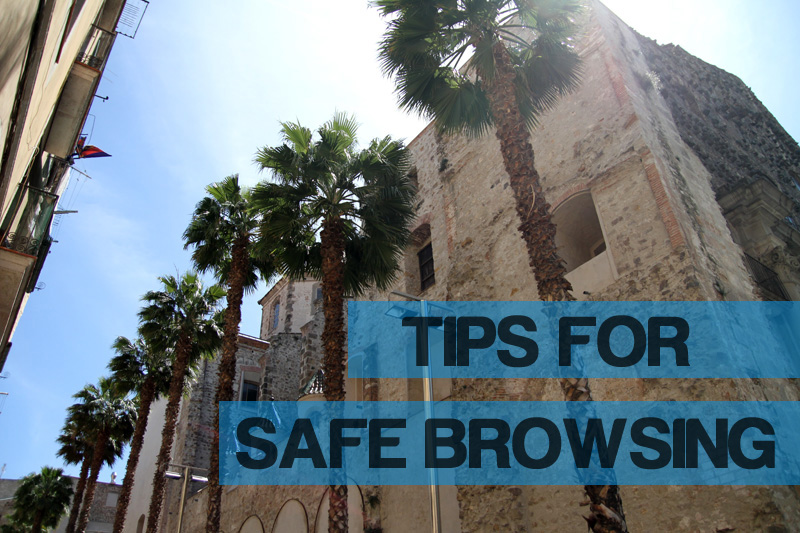
Tips For Browsing Safely Online
Changes to the browser landscape in last few years have given users more variety and choice when it comes to selecting a browsing methodology. Early in the Internet Explorer and Netscape days there was very little in the realm of ‘other options’ to users, this meant we were all essentially shoe-horned into using the OS-stock browsers.
Opera was an early shift away from this. In fact Opera, now in version 12, still has traction in the market with a loyal little set of users. Following on from Opera’s success is the more commonly known Firefox and Google’s browser Chrome, they offer outstanding reliability and performance plus the latest versions offer HTML 5 support and efficiently utilise the CPU and GPU in multi-tab browsing. Important stuff considering how much web hosting has changed in the last few years.
But are they more secure?
Google Chrome now includes built in malware protection called ‘Safe Browsing’ which displays messages to the user advising that content may be malicious. Additionally, the development team behind Firefox have also gone to great lengths building a safer browsing experience for their users.
Firefox features a section on their website that relates to ‘Tips for Secure Browsing’, a couple of these tips are:
– Browse using SSL secured sites as often as possible
– Clear browsing data, especially on public computers once finished
– Perform transactions at sites that are well established and that are familiar to you.
Of course these tips are fairly simple and help point you in the right direction whilst using the browser.
However there is a lot more you can do to help protect your browsing experience…
- Don’t be old school
Hopefully you are not reading this on Internet Explorer 6. If you are, please update it immediately! Out-dated browsers are slow and cumbersome to use and have little support for new coding languages, additionally they are perilously prone to malware and other associated harmful items.
Google Chrome has reached release 20, Firefox is currently at stable release 13 and Microsoft will be releasing Internet Explorer 10 late this year. If these numbers look sky high compared to your current browser version then hit that update button as soon as possible.
All browsers also come with built-in security settings which help protect you the user as best as possible. Check out their documentation and set your browser to a suitable level of protection. Some settings may make your browsing experience counter-intuitive, so try to find the best fit for your location (e.g. home, work, school).
Additionally, many of us may also have plugins for more customisable browsers such as Chrome, however it’s important to note that like the browser, the plugins can also become out-dated and a security risk. Keep it all in check and set those updates to ‘automatic’.
- Use protection
There are numerous programs out there posing to be genuine anti-malware/virus software which are actually malware – many people unsuspectingly fall prone to these programs which damage the OS and cause data loss.
Widely recognised virus protection software provider AVG offers a free version, which also includes a built in safe-browsing plugin for Chrome. AVG is handy for keeping your home PC protected, add this to the standard Microsoft Security Essentials package which is freely available from Microsoft’s website for a more secure home computer.
If you would like to do a scan for malware on your computer, there are few of the respected programs out there which help search your system for malware or Trojans. These include Spybot Search & Destroy and Malwarebytes. These programs are free and can detect a huge number of viruses, malware and trojans thanks to their ever expanding databases.
Please use caution when seeking these applications and download from the original developer’s website to be certain you’re getting the genuine version.
- Keep it personal
Your personal information is a highly lucrative resource; everyone has heard horror stories of identity theft and credit card fraud. Protecting yourself and your personal information online should be at the forefront of everyone’s mind as you can never be too cautious.
For example, when purchasing from online stores always look for trusted sellers; Amazon, Kogan, Asos – to name a few. Companies that place an emphasis on the security of their customer data are usually repaid by respect and loyalty from their buyers. This means the standing of the online store increases and reputation is enhanced. I’ve personally had good experiences purchasing from small and large online retailers; however there are a few ways in determining if where you’re buying from is kosher:
– Check to see if the page is secure, the URL will begin with ‘https://’ and includes a padlock – This implies it has an SSL certificate installed. SSLs encrypt sensitive personal information (credit card or banking information, SSNs, etc.) online.
– Contact the seller before a purchase if the store is located overseas, you’ll be able to build an understanding of their brand and how their customer service performs
– Search Google for past user experiences, reviews are there to help everyone identify dodgy online stores before someone else becomes a victim.
- Don’t download a dud
Watching or streaming live sports, film or other content can seem easy and harmless, but many of the unsolicited websites contain malware and can do more damage than you imagined.
Additionally a lot of content online is usually of an untoward nature – steer clear of anything you simply don’t need to access and avoid downloading items which are illegal or includes pirated content.
Surf safe and we hope you continue to enjoy our blog!
| Hosting Options & Info | VPS | Web Solutions & Services |
|---|---|---|
-
Alica Herrod
